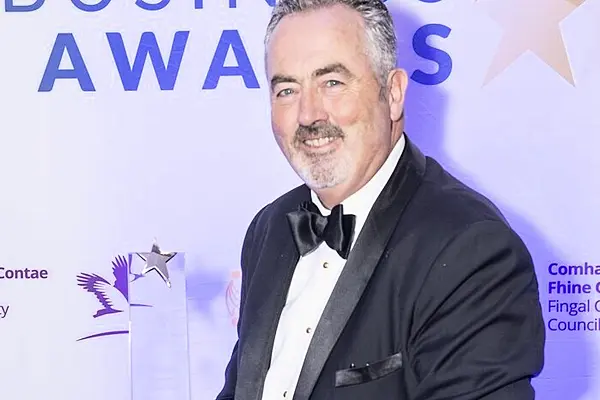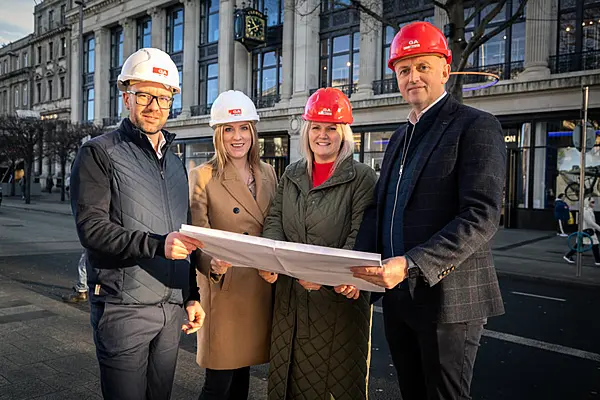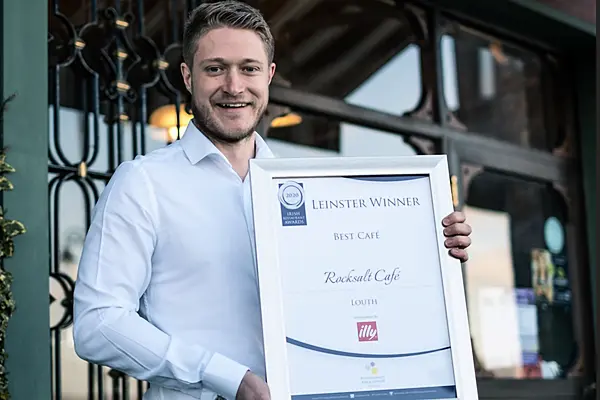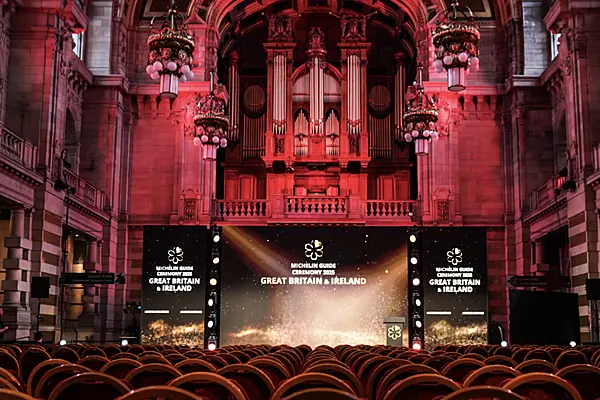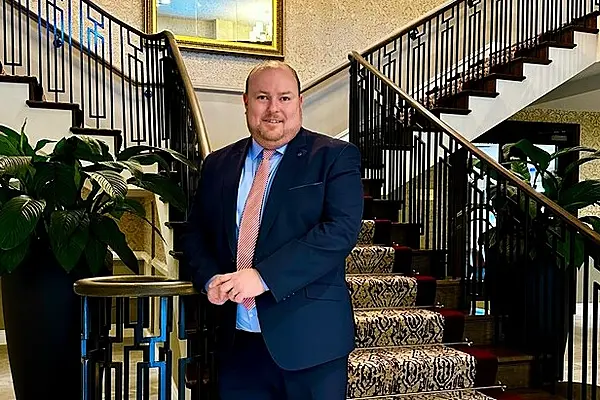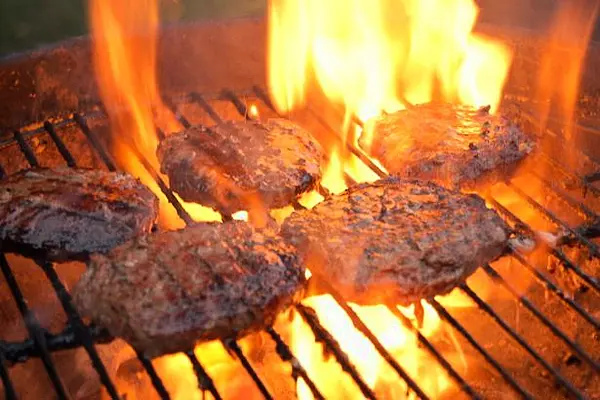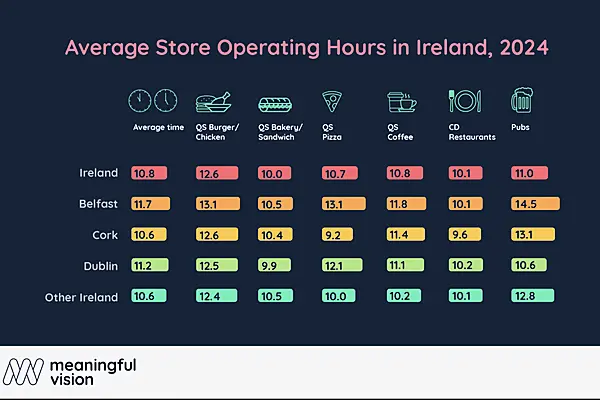Ian McGuinness, CEO of Roganstown Hotel & Country Club, talks to Robert McHugh about hs journey.
Roganstown Hotel & Country Club celebrated 20 years in business last year. The house itself dates back to approximately 1820, with the property and surrounding land steeped in history back to Norman times.
Today, Roganstown Hotel & Country club is operated by CEO Ian McGuinness, who transformed the farmland which had been worked by his stepfather's family since 1916, into a luxury hotel in North County Dublin.
Roganstown Hotel & Country Club boasts two golf courses, a leisure centre with gym and pool and a 52-bedroom hotel complete with bars, restaurant and conference and banqueting facilities suitable for corporate events and weddings.
Post-Covid, McGuiness has invested over €1 million into enhancing Roganstown Hotel & Country Club which originally opened in 2004. The hotel has over €5 million in annual turnover and has raised over €300,000 through charitable efforts since its inception.
The son of a hard-working mother who, after her husband’s passing, worked full-time whilst growing and selling lettuce on the weekends before remarrying and starting a golf offering at her new husband’s farm in Roganstown, McGuinness was well acquainted with enterprise from a young age.
Having worked on projects for Siemens in Germany, Italy, China and in Pyongyang in North Korea, McGuinness gained global experience in leadership and business development.
After returning to Ireland to complete an MBA, McGuinness continued his international career with Glen Dimplex and later Microsoft, but the draw of Roganstown never left him.
How did it feel to win the Business Person of the Year at the Annual Fingal Business Awards?
I was a little bit shocked to be honest. It's nice for a small company with 70 people. Normally when I go to those awards, it's fellows from multinationals.
I came from a multinational, I was director of Microsoft for years. They are the people who normally get recognised at these things. So it's nice for me and I was absolutely blown away to get the award.
I work with my family here in the business, we started from nothing. We have 70 employees now so we are quite a decent employer in the area.
We try and look after local suppliers and all that kind of stuff, so it was a real hooray for the small guys to be honest. People are now asking if they should bend the knee when they come in front of me!
Roganstown Hotel & Country Club recently celebrated 20 years in business. What have been the highlights?
It's funny because we started this thing back in 2000. Well, I started in 1999 through a whole series of planning.
I was working for Microsoft at the time. We put the whole project together and I had a lot of issues with Fingal County Council trying to get it organised and get it over the line, and then financing, and finally getting it open in 2004.
It was the Celtic Tiger, everything was great, and then of course 2008 arrived and everything went downhill in a major way, and we were lucky to survive. It was a lot of cutting and pushing and basically just, you know, hardship. We were delighted to survive but a lot of places went under.
I think we were the only development of our type that did not end up in Nama. So we managed to get away, we still own it. We still have a little bit of debt on our balance sheet, but we've come out the other end.
It's all testament to the amount of work I put in. This included arguing with banks over 10 years, with 24 account managers in eight years!
I imagine your corporate background helped you during this time?
I've been through a lot of that stuff, working with large multinationals. I was director of operations from Microsoft for small medium business in the Europe, Middle East and Africa at a P&L of $2.6 billion US dollars. It was a huge team in Ireland and then working with 209 distributors across 61 countries.
I never had to worry about who to pay on a Thursday. It is totally different when you are running your own business. You are cosseted in a large organisation. The salary appears at the end of the month. You have got revenue targets and you also have costs to manage. But you never have to worry if there is enough money in the bank to pay the staff on a Friday.
There was a lot of managing cash flow, managing monies, trying to make sure our suppliers were paid. That is one thing I am proud of. We have never welched on a supplier. I have seen other companies go into receivership and they left their suppliers hanging out there for God knows how long, bringing people down with them. So we make sure that everybody's paid and it might be a little late but you will get it.
We are out the other end now. We have got a really nice team. We just had our Christmas party there last Sunday. We have a Christmas party in January every year, 50 of us went out for dinner. One lady recently celebrated her 70th birthday. She's with me since day one.
It's a funny kind of an industry. We have people that have been here 15 years. My general manager was on the opening team. He was the bar manager. He went away to other places and he's come back now as general manager with me. My salesperson is with me for five or six years. My financial controller was with me on opening day. She went off around the world and now she's back with me again.
We have a good solid crew and it's a nice environment to work in. Over the last couple of years, we have been working on trying to make sure that our staff stay long-term. It makes life so much easier. You need a core team of people who are going to lead you.
We are an interesting business because we are not just purely a hotel. We have golf facilities as well, golf is 20% of our business. We have a large leisure club with a thousand members, so it's a nice kind of balance. It's not just one business, which is great. We offer a great service to the local community, with people coming through the door every week. Leisure members normally turn up in January.
There have been a lot of highlights and a lot of pain. I am more relaxed now than I was 10 years ago. This is a heavily capital intensive game.
What challenges have you faced in the industry?
The crash in 2008 was one thing and then Covid came along. You know Covid was good and bad. It was soul destroying, walking around a building that is supposed to be vibrant and there is nobody here. All of the grants and wage subsidies were brilliant. I must say the government moved fast, they supported us.
And then, of course, we had the Ukraine war. I remember our gas bill was running at about €6,500 a month plus VAT and I hadn't managed to negotiate for a new contract and it went to €25,500 in a month. So it's those kind of shocks. We're in good shape now.
We've invested a lot in energy. We have solar panels and a wood chip boiler. We have robotic mowers that are mowing all the fairways, so we are saving diesel.
My focus at the moment, after getting us on an even keel financially, is to protect us for the future, so that we are not at the vagaries of energy price shocks, which is a real big issue.
What drew you to the hospitality industry?
My family lived on a farm and my stepfather wanted to retire. None of us were interested in farming.
I have a brother, a half brother and a half sister. My mother set up Swords Open Golf Course and she basically pioneered that from 1990 onwards. It was doing quite well.
They were living in the house, the two of them rattling around in a big old Georgian house wondering what will we do? I think they thought they should be doing something else with the farm.
In 97-98, we came up with an idea to do something with the house. It developed from a restaurant to a whole resort. I put the whole plan together, I got the finance, I got the loan.
I worked with Fingal County Council to get a mark on the map and we got it zoned as an an integrated tourist and recreation scheme. I was project managing the actual project.
I was working for Microsoft but in my spare time I appointed architects, I did a deal with McInherney's to built the hotel. We got planning permission for some houses. I remember going to design teams meetings over in Rathfarnham at seven o'clock in the morning and at quarter past eight heading to my office in Sandyford.
I would be working all day, putting in 60 hours a week in Microsoft and 40 hours a week on this project. There was a lot of travelling, there were no zoom calls back then! Everything was phone calls, you barely had email for God's sake.
It was a lot of work. As we got building on this project, it started to slip. It was a case of either taking on somebody full-time to run it, and me staying in Microsoft, or me leaving Microsoft and coming back to run it full-time.
I made the decision to come back. It is a major positive that I can spend more time with my family. I was traveling a lot when I was with Microsoft. You're gone early in the morning. You're back in the evening and you have dinner and then you're back into emails.
That's why I ended up coming back to Roganstown. I quit Microsoft at the end of December 2003. I gave four months notice and I started full-time here on January 1, 2004.
I project managed the build until the end of March, which is when we opened. I have stayed around ever since.
I'm good at the background operations. I have people who deal with customers.
What has surprised you most about your hospitality journey?
I've always enjoyed the ride. The actual hospitality industry is funny. You meet the same people all over the place.
If I could work nine to five, Monday to Friday, I would. But sure, people don't go out nine to five, Monday to Friday. We are servicing people during their free time and their free time does not happen from nine to five.
I'm an accidental hotelier. Who would have thought that a guy who did engineering and then an MBA would end up back in a hotel!
What do you consider your best business decision?
There's two ways to look at it. I've gone through hell for years, trying to manage banks, and trying to get out of debts that we shouldn't have had.
You make a decision, you put a plan together. And once the plan is in place, and you finance it, something goes wrong, and all of a sudden you have to redo the whole thing and start all over again.
When I planned this, we were supposed to get planning for a load of houses which would help finance it. When we had the thing half built, the county council decided that they weren't giving me all the houses. All of a sudden I was short million and a half capital. My whole plan had to shift.
Looking back, every time you make a decision, you make it for the right reasons. If I wanted to be rich and have no money worries or whatever, I would have stayed at Microsoft, but I wouldn't have had time with my kids and time at home. I wouldn't have been able to play golf whenever I want to. My personal life is better now than it would have been if I had stayed with Microsoft.
On the other hand, this is a business that's heavily capital intensive. You're talking about staff costs up 39%. You've got huge insurance bills, you've got energy bills. By the time you come to the bottom line, there's not a lot there.
The most recent good decision I made was to put in the wood chip boiler in and incorporate solar panels. This means in the future, we will less reliant on other external factors.
When I was with Microsoft, I was very senior, but I couldn't decide a make or break decision. Now, I can decide how I want to spend money in the business. Its a lot more flexible and we can do things quickly.
What plans do you have over the coming year?
We are continuing our energy push and will hopefully have a new Building Management System later on the year. We will also plan some small refurbishment work.
We do a lot of tour groups during the summertime and that's a nice base business. We are trying to push forward our wedding business.
The whole wedding business has changed. It's very expensive to get married. Every hotel you speak to will say that their wedding business is down compared to where it was five years ago. It is a movable thing. We want to push different styles of weddings.
I do have plans for an extension hotel. We do not have enough bedrooms. We are trying to get Fingal County Council to grant us permission for another 60 rooms and more conference space.
We want to upgrade our Golf Academy. We are well known in Ireland for our Junior Academy. We've had a huge amount of success. It's only going about 12, 13 years. We have five kids on full scholarships in the US. We have a young fellow, Sean Keeling, who was one of our juniors. He actually got a full scholarship into Texas Tech University in the US after fifth year and was advised to play in the Irish Open. He played the Irish Open last September. We are very proud to be a part of that.
It's unbelievable and the kids are amazing. We have won a lot of inter-club events. We probably have about ten kids who have represented Ireland somewhere. Sean represented Europe at the Junior Ryder Cup in Rome.
What do you like to do when you're not working?
I love rugby. I go to all of the home internationals. My wife is 60 this year, so the following week we are travelling to Africa for a nice holiday. I'm looking forward to that.
I play golf at least once a week. I probably read a novel a week. I read spy thrillers and fantasy novels. I'm a voracious reader but golf and rugby are my two main passions, to be honest.
